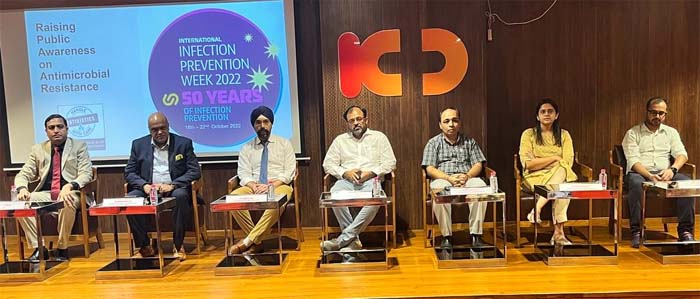- The World Health Organization (WHO) warned that antimicrobial resistance is one of the top ten global public health threats facing humanity
NE HEALTH BUREAU
AHMEDABAD, OCT 18
India is one of the countries worst hit by what doctors call “antimicrobial resistance” (AMR) – antibiotic-resistant. The World Health Organization (WHO) warned that antimicrobial resistance is one of the top ten global public health threats facing humanity. Experts have even estimated that as many as ten million people could die each year as a result of antimicrobial resistance by 2050.
Antibiotics – which are considered to be the first line of defence against severe infections – did not work on most of these cases.
To mark the International Infection Prevention Week – October 16-22 – KD Hospital, Ahmedabad on Tuesday announced that it is one of the leading institutes focusing its efforts to create awareness around the increasing trend and effective management of antimicrobial resistance (AMR).
AMR also known as antimicrobial drug resistance, occurs when microorganisms such as bacteria, fungi etc. change in such a way that the medications used to treat infections they cause are rendered ineffective. In 2019, The Lancet, a medical journal revealed that such resistance directly caused approximately 12,70,000 deaths worldwide[i]. India has one of the highest rates of AMR in the world, and according to government’s data released in 2019 these infections claim lives of close to 7,00,000 Indians annually.
AMR infections usually require the use of second line and third line treatments which can cause serious side-effects, such as organ failure and prolonged care and recovery, which could go on for months. The overall misuse and overuse of consumption of antibiotics which should only be used to treat the most serious infections like difficult-to-treat bacterial infections, and poor infection prevention and control, increase the spread of AMR. This rise in mortality and morbidity due to AMR infections is very alarming and the WHO and CDC have suggested that steps can and should be taken at all levels of society to reduce the impact and control the spread of resistance. Individuals, policy makers (government), healthcare professionals and the healthcare industry should all collectively contribute towards reducing the incidence of AMR infections.
“Antimicrobial resistance (AMR) is already quietly killing an estimated 7,00,000 people each year. This unfortunate reality is not making headlines. We need to prioritize AMR as the threat that it is and understand and communicate the consequences if it continues to go unchecked. The COVID-19 pandemic has shown how infectious diseases can travel the globe and affect nearly every aspect of our daily lives. It also provides a window into our future if we do not mobilize a coordinated, sufficient national response to drug-resistant infections caused by antimicrobial resistance (AMR)” commented, Dr Parth Desai, Chief Operating Officer, KD Hospital.
As part of its awareness drive, the hospital will undertake various initiatives in tandem with other hospitals, healthcare workers, including medical practitioners in rural areas. And for the first time, we are carrying out this awareness drive against this. We urge the common public, not to take self-medication of taking anti-biotics and visit the hospitals to prevent the spraed of AMR, added Dr Parth Desai.
While there is no standardized region wise data on resistance rates, a few reports from hospitals and communities suggest that the overall resistance level is increasing by 5 to 10% every year for broad-spectrum antimicrobials which are highly misused. A data analysis done by Indian Council for Medical Research (ICMR) between January 1 and December 31, 2021, found a sustained increase in drug-resistant pathogens, resulting in difficulty to treat certain infections with available medicines. This is a major concern because a resistant infection can spread to others and potentially impose huge costs to individuals and society.
Dr Harjeet Dumra, Senior Pulmonologist and Intensivist said, “Adopting antimicrobial stewardship is a critical component of this, and one of the first steps that must be taken is to raise awareness and understanding of AMR through effective communication. The Centre has taken cognisance of this and set up a high-powered panel to suggest various measures to contain it.”
Dr Jigar Mehta, Intensivist emphasized Governments, researchers, and industry partners around the world have mobilized to develop recommendations, diagnostics, therapeutics, and vaccines for COVID-19. It’s important to mobilize now to address AMR in the same way
Shyamakant Giri, Managing Director & President, India Business and Emerging Markets, Amneal Healthcare said “As industry patrons, it is also our responsibility to develop or collaborate in developing platforms which help in preventing transmission of hospital infections and antimicrobial drug resistance. Uniport is a first-of-its-kind closed IV technology platform that is being manufactured by Amneal for India, in India. This will set new standards for delivery of IV solutions in the country. The INICC (International Nosocomial Infection Control Consortium), recommends use of closed infusion systems for administration of clinical treatments in hospitals. The government of India has taken several measures to control the rise of AMR in India, we look forward to partnering with stakeholders like KD Hospital to reduce this burden by increasing access to this innovative technology for advanced care.”
Amneal Healthcare, subsidiary of NYSE-listed Amneal Pharmaceuticals, announced its commercial operations in India recently. Uniport is a safe IV with multipurpose single port bag offering a versatile and adaptive closed-infusion system. The Uniport bag introduces several technological advancements for optimum utilization like self-collapsibility, easy to squeeze, transparency for clear visibility.










